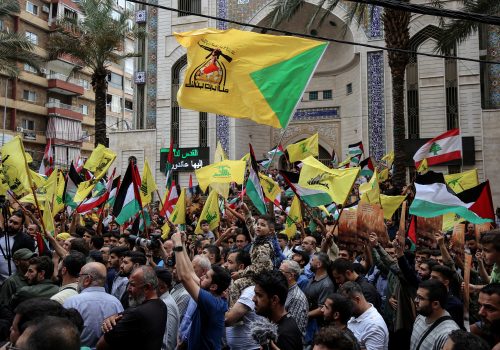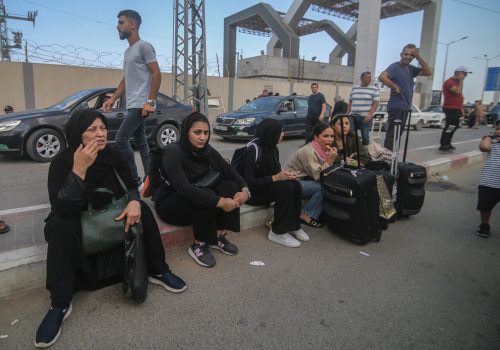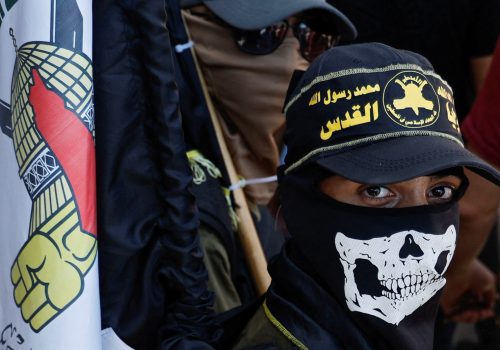The Gaza war will be the final straw for Netanyahu’s long political career
Just a few weeks ago, it finally seemed that Prime Minister Benjamin Netanyahu had played a winning card after a few difficult months since the inauguration of his sixth government. In the wake of being shunned by the Joe Biden administration and having visits to Arab capitals indefinitely delayed, Netanyahu hoped to secure a grand deal with Saudi Arabia—something that could not only quell the protests against the embattled prime minister but also win him a Nobel Prize and cement his reputation as the most talented statesman in Israel. Riyadh, it seemed, was almost within reach.
But then Hamas executed a massacre in the south of Israel on October 7. The Israeli army failed to prevent and protect, Israel’s intelligence agencies failed to predict, and the Netanyahu government was slow to react to the disaster. It was the 1973 Yom Kippur War all over again. However, this time, the civilians were the ones who largely paid the horrific price of negligence and arrogance.
“We are at war; the enemy will pay an enormous price. I ordered the army to clear the towns from terrorists, and that is being done right now. We are at war, and we will win,” Netanyahu said on October 7, confident as always. At that very hour, 11:00 am, hundreds of Israelis—civilians and soldiers—were already dead. Others were hiding from terrorists or fighting for their lives, not knowing that Hamas had conquered the entire Gaza Envelope, which is part of the Western Negev within roughly four miles of the Gaza Strip border.
By the end of the day, the whole nation watched the news silently; they were in disbelief that such a scenario could happen in Israel. After being told time after time by politicians and army chiefs that Hamas had suffered severe blows and that “what will be is not what we had,” many realized that these statements were no more than hot air.
“Mr. prime minister, go to the media and apologize! These people were murdered under your watch,” cried Shirel Hogeg, whose family members were wounded during the Hamas attack in Kfar Aza.
In just a few days, a poll conducted by Dialog Center indicated that an overwhelming majority—86 percent of respondents, including almost 80 percent of coalition supporters—said that the attack by Hamas was a failure of the country’s leadership. Over 75 percent said the government bears “most of the responsibility.” By now, Chief of Staff Herzi Halevi, Chief of Israeli Military Intelligence Aharon Haliva, and Shin Bet Chief Ronen Bar have all claimed responsibility for the failure.
The only top figure that remained silent was Netanyahu, even though his ministers and Knesset members, such as Minister of Education Yoav Kisch and Member of Knesset Eliahu Revivo, had already made public statements. The only reference to the responsibility Netanyahu made so far was during the opening of Knesset’s winter session on October 16: “There are many questions about this catastrophe that happened ten days ago… We will investigate to the end, and we have already begun to utilize our lessons, but for now, we are focused on one goal—uniting the forces and storming on to victory.”
But, this time, Netanyahu will storm to victory with Benny Gantz, ex-chief of staff and minister of defense, with whom he—after great pains and delays—had formed an emergency government—a move that was supported by the vast majority of Israelis. A narrow war cabinet was established, which currently includes Netanyahu, Gantz, Defense Minister Gallant, former chief of staff and Member of Knesset, Gadi Eizenkot, and former Israeli ambassador to the United States and Minister of Strategic Affairs, Ron Dermer. The most extreme coalition members, Minister of Internal Security, Itamar Ben-Gvir, and Minister of Finance, Bezalel Smotrich—who used to have the upper hand in government until now—were sidelined. One Likud minister, the notorious Information Minister Galit Distel-Atbaryan, resigned, acknowledging that her office was “a waste of money.”
Yet, for now, despite the public anger and the frequent calls for him to resign by former ministers and bereaved parents, Netanyahu is still busy with petty politics. He held his only meeting with the representatives of the forum of kidnapped Israeli families on October 15. During it, his aides introduced some previously unknown families who allegedly expressed their willingness to sacrifice their children for the sake of a military victory.
The shocked families narrated the story and indicated that the prime minister and some circles around him still lived in the politics that existed before the terrorist attack on October 7. However, the situation has changed—probably for good. Israel continues to identify, bury, and mourn for its dead. There is a reasonable fear that, following the ground operation in Gaza that was already announced by leaders of the emergency government and the chief of staff, there will be many more funerals and much more grief.
Every day, Israelis are exposed to numerous heartbreaking stories and the unbelievable degree of failure of all that was deemed to be secure, flawless, and reliable. Prime Minister Netanyahu, who promised to “crush the Hamas” in his 2009 election campaign, is now evacuating cities like Sderot and Kiryat Shmona, while Tomer Glam, the mayor of Ashqelon, a 130,000-strong city situated just miles in proximity to Gaza, cries to evacuate those who lack access to shelters. While Glam directly accused the minister of finance, Bezalel Smotrich, of leaving Ashkelon with “nothing but a prayer for protection,” it is a known fact that consecutive Netanyahu governments failed to provide the residents of the southern city with shelters despite endless promises.
The anger in this city, as well as in many other communities, is mounting. Although Netanyahu’s voters have often been angry with him in the past, they generally came back home and supported him during the elections. It seems that things will not be as they were this time around.
The horrific failure of the state and the army to protect the civilians in the south brought the total collapse of the “conception” that Netanyahu eagerly promoted: divide and rule the Palestinians; cajole Hamas with money; weaken the Palestinian Authority; and keep the Palestinian state away. The unpreparedness of the state to deal with mass evacuation, as well as difficulties in transportation of the reserve soldiers, uncovered the inability and lack of strategy in government offices. The warm embrace President Biden provided to the families of the kidnapped American Israelis and the heroes who survived the massacre and fought the terrorists highlighted the detached and cold attitude of Netanyahu, who seems to be unable to talk to his own people. An explosive combination of all of these factors will determine the political fate of the longest-serving Israeli prime minister.
Right now, it’s still hard to imagine the first day after this war ends, since the conflict has just entered its first phase. Yet, when this day eventually comes, the Israeli political system will look very different from the present moment. Not only will Netanyahu pay the price for this failure, his share of the blame will be much larger than anyone else’s. For years, he used to sideline all of his ministers and aides and aggressively took most of the credit. After the Yom Kippur War, it took three years for the great shake-up of 1977, when the Likud whisked away the power from the Labor Party. After October 7, it will probably take much less time.
Ironically, the man who claimed that it was possible to promote peace with Arab countries without the Palestinians will have his career ended due to yet another war with the Palestinians. And, tragically, Netanyahu’s faulted policies have involved Israel in yet another brutal war that might leave many more families grieving for their loved ones.
Ksenia Svetlova is a nonresident senior fellow with the Atlantic Council’s Middle East Programs, and is the director of the Israel-Middle East Relations Program at Mitvim. Follow her on X: @KseniaSvetlova.
Further reading
Wed, Oct 11, 2023
Hamas’s attack on Israel was straight out of Hezbollah’s playbook
MENASource By David Daoud
The genesis of Operation Al-Aqsa Flood appears to originate with Hezbollah, at least in part. The pressing question now is what will Hezbollah do next?
Sat, Oct 14, 2023
Egypt cornered over Israel’s war on Hamas
MENASource By Shahira Amin
Whether Egyptian President Abdel Fattah el-Sisi will bow under US and Israeli pressure remains to be seen.
Tue, Oct 10, 2023
Hamas’s attack underscores the need for US and Israeli policy to change course
MENASource By
Both Israel and the United States should engage in deep introspection at the policy level over their failure to deter Hamas’s brutal attack.
Image: Israeli Prime Minister Benjamin Netanyahu met with combat soldiers at the Gaza border on Thursday October 19, 2023 and said to them, we are going to win with all our might. Netanyahu asked the solders if they were ready and they responded with: yes, until victory, speaking as the ongoing Israel-Hamas war continued. The war began on October 7 after Hamas militants stormed into Israel, and Israel vowed to destroy the Palestinian militant group. (GPO/EYEPRESS)


